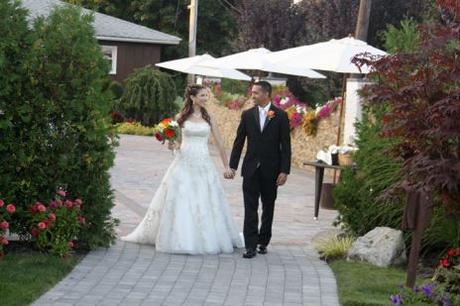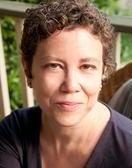
Photo, Cassarino Studios
I recently met Rorri Geller-Mohamed at Brookville’s Multifaith Campus on Long Island, where her family has the ongoing support of both a rabbi and a progressive Muslim study group. I invited her to write for OnBeingBoth.com about her Jewish and Muslim interfaith family. Here’s her first post, on her wedding planning and weekend of celebrations.–SKM
Most brides love talking about their weddings, but I especially enjoy sharing my interfaith wedding story. My husband and I were blessed to have family, friends, and a whole lot of dancing to celebrate the union of our different backgrounds and religions. I hope that our wedding inspires interfaith couples that feel overwhelmed and intimidated to know that it is possible to have the wedding of your dreams. My husband is a Guyanese American Muslim and I am Jewish American. Our wedding was the perfect celebration of the coming together of our religious identities as well as our cultural and family traditions. We joked about how our wedding photos would be the perfect advertisement for world peace.
An Imam, A Rabbi, and Bruno Mars
How do a Rabbi and an Imam plan a ceremony together? First, they discussed with us what prayers and traditions are typical for a Jewish wedding and Muslim wedding. Then, we met together to figure it out. We were honored to have an amazing Imam and Rabbi who wrote a beautiful ceremony for us, intertwining blessings from both our religions and incorporating Hebrew, Arabic, and English. We included the Jewish tradition of breaking the glass and had a kiddush cup filled with grape juice instead of wine because drinking alcohol can be viewed as haram (against the religion) in Islam. We also had yarmulkes available for whoever wanted to wear one for the ceremony. We made the non-traditional decision for my husband and bridal party to dance down the aisle to the upbeat song “Marry You” by Bruno Mars (who has intercultural and interfaith heritage himself) in order to get all of our guests into the celebratory spirit. I walked down the aisle with my parents to “All of Me” by John Legend. We both love music and felt that it was the perfect way to start our unique ceremony.
Us & Family
I was excited about the opportunity to plan our wedding with the goal of honoring both of our identities, and sharing them with our families. My husband had some concerns about how his family would feel about it not being done in their traditional Islamic way. My husband and I wanted to make sure that both of our families felt comfortable. We consulted with family along the way as we made our decisions. It was very important to us that our parents approved of our wedding. Traditionally, a member of my husband’s family officiates family weddings, but there wasn’t anyone that had experience and felt comfortable performing an interfaith ceremony. We spent time discussing our Muslim officiant’s credibility, sharing the written ceremony, and addressing concerns with my soon-to-be father-in-law. It was important to my parents that Jewish traditions were part of the celebration and that I was married by a Rabbi.
While incorporating both sets of traditions, we also felt empowered to make changes to ensure that it was the best day for both families. For instance, traditionally, my husband’s family has to do a lot of the work preparing for a family wedding. They often stay up all night cooking the food, decorating the hall, and even baking the wedding cake. However, it was important to my husband we have a different kind of wedding where his family could enjoy the celebration without having to do any work. We accomplished this by having our wedding catered at a beautiful outdoor venue.
Extended Celebrations
We had multiple family gatherings throughout the weekend as part of our wedding that really allowed our family members to meet and get to know each other. Although we were both a little apprehensive about how some of our extended older family members might act or what they would say, everyone got along really well. My husband’s family, from the Indo-Caribbean culture from Guyana in South America, organized an extremely personalized mendhi party for me and invited both of our families to come and get painted with henna. It was amazing and really made me feel welcomed into their family. My husband’s cousin and his little son did a mini-dance performance to traditional Indian music, we ate traditional Guyanese food, and they gifted me with a sari and traditional wedding sweets. It also was a great opportunity to introduce my family to their cultural traditions and for both families to mingle and get to know each other.
Party Time
My husband and I both love to dance. Not all Muslim weddings in his family have had music but it was important that our reception represented us even if didn’t follow some traditions. We also sought out an MC and DJ that could play music to keep both of our families and friends entertained. We did the horah, a traditional Jewish celebration dance, played West Indian music like reggae and soca, and included traditional Indian music to please some of the older crowd. Everyone was up dancing and mingling the whole night. Looking back at it, we had a blast and couldn’t imagine celebrating any other way.
Advice for Planning a Jewish Muslim Wedding
From our experience, here are a few tips for other Muslim and Jewish couples trying to figure out how to plan their wedding:
- Communicate with your partner about your wedding vision and what typical wedding ceremonies and receptions look like in your family. This gives you a starting point for creating your joint vision together.
- Consult with your families along the way. This gives you and your family members time to process and address any concerns and prevents any surprise reactions on your big day.
- Give yourself plenty of time to research and find an officiant or officiants that fit what you are looking for. Good starting places include Muslims for Progressive Values, interfaithfamily.com (for rabbis), and Brookville’s Multifaith Campus (for those in the New York area). Have confidence that you will find an officiant or officiants that can do the ceremony you want–it just can take some time.
- Take family halal or kosher dietary needs into account for the reception. Some people believe that kosher food is also halal, but find out about your family or your partner’s family’s opinion about this. Many caterers can accommodate this for a small fee, you just have to ask.
- Remember it’s only one day. Yes, it may be one of the most meaningful days in your life and a symbol of your unity shared with friends and family, but it is still only one day. You have a lifetime ahead of you to share together with your loved ones.
- Reach out for support and ideas. If you are in a Jewish and Muslim relationship, join the new Jewish-Muslim Families Facebook community and connect with people who have been in your shoes. The Network of Interfaith Family Groups connects interfaith families (of any religion or none) who seek to celebrate both family religions. Additional support for interfaith couples can often be found with local progressive clergy, therapists, and inclusive communities.
Rorri Geller-Mohamed ([email protected]) is a licensed therapist who specializes in issues of identity and supporting mixed couples.
Susan Katz Miller is the author of Being Both: Embracing Two Religions in One Interfaith Family, from Beacon Press. She works as an interfaith families consultant, speaker, and coach. Follow her on twitter @beingboth.

